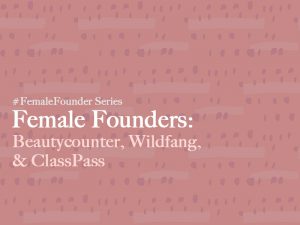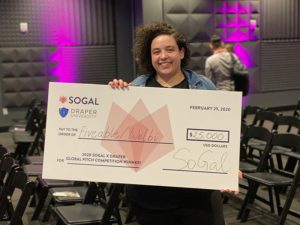Few startups reach unicorn status, even fewer unicorns are run by women, and even fewer are run by BIPOC women. Payal Kadakia shattered several glass ceilings as an Indian American woman with her startup ClassPass. However, the ClassPass we know today that accrued a worth over a billion dollars wasn’t the company Kadakia built when she first decided to become an entrepreneur.
Let’s learn more about Payal Kadakia’s entrepreneurial journey and how she rose to her astronomical success.
Payal Kadakia: Getting Started
Before she even realized she wanted to become an entrepreneur, Payal Kadakia began gathering inspiration for her billion dollar business idea in college. She began studying at the Massachusetts Institute of Technology back in 2001. Kadakia felt excited by the school’s promised rigor and prestige, but she grew disappointed that the campus didn’t offer an Indian dance group that practiced her style. In true entrepreneurial fashion, she started her own. That group still exists on the campus today.
While this may seem like an anecdote that many eager college freshmen could share, it showcases two important facts about Kadakia. She has a deep passion for dance and she has the drive of a passionate problem solver.
Kadakia carried this passion through college and into her job at Bain Capital after graduation. While she worked there, she continued dancing in her spare time. She felt that with Bain Capital, she didn’t have enough balance to dedicate enough time to her passion for dance. She transferred over to a job in the music industry. It promised her a more stable work schedule, so she could better plan out her routine as a dancer. While that helped, she still felt like she could find, or make, a better path for herself. One that allowed her creativity to shine not as a side project but as a profession as well.
She considered entrepreneurship. What better way to create your own professional life than starting a business? So she got started. She told herself that she had two weeks to figure out a business idea. If that didn’t work, she’d move on to another career option. She said, “Everyone always asks me, ‘Why’d you give yourself two weeks?’ I didn’t want to waste time. I felt like if I was going to think of something in two weeks, I was going to focus on it and see if I could do it. And if not, I was going to go and try to find another career option in the arts or somewhere else in entertainment that could bring together my business and creative sides.”
36 hours into this thought experiment, she tried to find a dance class to book for herself. She felt completely overwhelmed by the flood of information: schedules, prices, packages, skill levels, and more. She ended up not booking a class at all. But it gave her an interesting idea for a business. How could you make it easier for people to find and book a fitness class?

Payal Kadakia: Experimentation
She researched the concept for six months and then quit her job in 2011 with two years of savings in her account. Her original idea wasn’t what ClassPass is today. She wanted to create a search engine for dance and fitness classes called Classtivity. Kadakia spent half a million dollars to build this company, but on launch day, she didn’t get any booking reservations. She said at that moment, she became an entrepreneur because she had to completely rethink her approach.
The site had around a million classes listed. So why was no one booking? Clearly they weren’t short on options. Kadakia figured out that she “hadn’t properly motivated people to go to class.”
After rethinking her approach, they relaunched with Passport in 2012. This idea packaged a month of free classes at different studios for subscribers to try. The concept depended on getting people in the doors for free, and then having them fall in love with the gym and getting a membership. However, that’s not how it played out.
Kadakia said that many studio owners told her people kept coming back…but just used a different email to sign up for more free classes. They were avoiding paying membership fees. Less than 15% of users actually chose to pay for the products.
Kadakia listened to what studio owners had to say and redesigned the concept once again. Finally, she relaunched with ClassPass in 2013 and the rest is history.

ClassPass
ClassPass declares itself the “world’s most flexible gym membership.” When you pay a monthly subscription, you get access to thousands of studios and gyms in your area. You get to book classes in all different gyms, so you get to pick and choose what you like from each location without having 10 gym memberships.
The system has changed from a number of classes per month to a credit system. You get a certain number of credits each month and then different classes cost a different amount of credits.
Kadakia believes that the success of ClassPass comes from the company’s vision beyond just offering a one-time service. She said, “I didn’t want to build a product for a month. I wanted to build a lifestyle. And the biggest thing we’d discovered was people loved variety. The trend we’d hit on was that fitness could be fun and exciting and something new that people want to do.” She wants people to be bold, get out there, and try new things. “The crux of what we got right is that we got people to say yes to new experiences again and got rid of their fears. In their first year of ClassPass, our customers try ten different venues—that’s ten different types of classes they would never have done before.”

Payal Kadakia Net Worth
Like all in-person services, ClassPass struggled during the onset of the COVID pandemic. After becoming the first unicorn startup of 2020, everything shut down in March. However, Kadakia kept the company going strong.
In 2021, MindBody acquired ClassPass. At that time, Payal Kadakia was worth a reported $60 million. She was so excited by the unicorn status and by such a large corporation’s acquisition of her company. Kadakia said, “Even though companies started by women are more likely to succeed, we still hear much more about the successes of male founders. I am so encouraged by the number of high-profile female founders whose companies have hit high valuations, some of which are starting to go public. I believe we all need to keep amplifying these important stories and modeling to the next generation of would-be-founders that if they work really, really hard, their entrepreneurial dreams just may come true.”
Author, Artist, Photographer.
Sarah Margaret is an artist who expresses her love for feminism, equality, and justice through a variety of mediums: photography, filmmaking, poetry, illustration, song, acting, and of course, writing.
She owns Still Poetry Photography, a company that showcases her passion for capturing poetic moments in time. Instead of poetry in motion, she captures visual poetry in fractions of a second, making cherished keepsakes of unforgettable moments.
She is the artist behind the Still Poetry Etsy shop, which houses her illustrations and bespoke, handmade items. She is the author of intricacies are just cracks in the wall, a narrative poetry anthology that follows a young woman discovering herself as she emerges from an abusive relationship.
- Sarah Margaret Henryhttps://www.womensbusinessdaily.com/author/sarah-margaret-henry/
- Sarah Margaret Henryhttps://www.womensbusinessdaily.com/author/sarah-margaret-henry/
- Sarah Margaret Henryhttps://www.womensbusinessdaily.com/author/sarah-margaret-henry/
- Sarah Margaret Henryhttps://www.womensbusinessdaily.com/author/sarah-margaret-henry/






